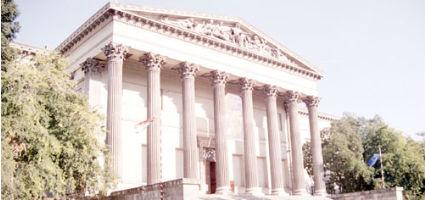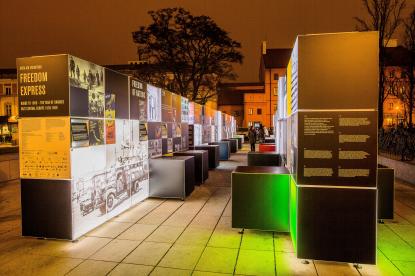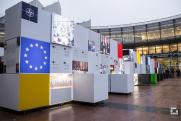2024. April 29. Monday
Hungarian National Museum - Budapest
 |
Address: 1088, Budapest Múzeum körút 14-16.
Phone number: (1) 338-2122
E-mail: info@hnm.hu
Opening hours: Tue-Sun 10-18
|
The exhibition has closed for visitors.
2015.07.02. - 2015.08.08.
Museum tickets, service costs:
|
Ticket for adults
|
1100 HUF
|
|
|
Ticket for students
|
550 HUF
|
|
|
Ticket for soldiers
|
550 HUF
|
|
|
Ticket for pensioners
|
550 HUF
|
|
|
Ticket for families
(2 adults + children)
|
1150 HUF
|
/ family
|
|
Individual guide
|
400 HUF
|
/ capita
|
|
Group guide
(max. 5 people)
|
1800 HUF
|
/ group
|
|
Group guide
(11-15 people)
|
6000 HUF
|
/ group
|
|
Group guide
(max. 15 people)
|
5500 HUF
|
/ group
|
|
Group guide
(16-25 people)
|
9700 HUF
|
/ group
|
|
Group guide
(1-5 people)
|
1500 HUF
|
/ capita
|
|
Group guide
(6-10 people)
|
13000 HUF
|
/ group
|
|
Group guide
(11-15 people)
|
16000 HUF
|
/ group
|
|
Group guide
(16-25 people)
|
24000 HUF
|
/ group
|
|
Group guide for students
(max. 25 people)
|
4500 HUF
|
/ group
|
|
Group guide for students
(max. 15 people)
|
6000 HUF
|
/ group
|
|
Group guide for students
(max. 25 people)
|
12000 HUF
|
/ group
|
The exhibition arranged by the European Network Remembrance and Solidarity shows the complex process by which Europe freed from communist dictatorship. The event is part of the socio-educational campaign called Freedom Express, which is implemented by the European Network of Remembrance and Solidarity, the Department of Human Resources, in collaboration with Ministry of Culture of Poland, Germany, Romania and Slovakia.

The show has been earlier to Berlin, Brussels and Warsaw deals with restrictions on civil liberty, and the fight for regaining it in the former Eastern bloc. It devotes a special interest to everything that connects or separates Central and Eastern European societies in terms of memory of the fall of communism in Europe.
The exhibition's idea came from the belief that reasoning about the changes that took place in 1989 would be more complete and profound when we view these events in a pan-European context. Our goal primarily is to recall the processes that ultimately led to the downfall of communism in this part of Europe - says Professor Jan Rydel, President of the European Network Remembrance and Solidarity Steering Committee.
The material travels around various forms of freedom. Some components are about freedom of expression, freedom of belief and religion and economic liberty, just to mention a few.
The geometric arrangement of exhibits allows space for urban areas to be separated from the place of encounter with history. Archival footage and text frames were placed on lit tiles thanks to which the visitors can view the exhibition after sunset- highlights Mirosław Nizio, the creator of the architectural concept .
The exhibition will be shown until 8 August in Budapest, followed by a European tour.

The show has been earlier to Berlin, Brussels and Warsaw deals with restrictions on civil liberty, and the fight for regaining it in the former Eastern bloc. It devotes a special interest to everything that connects or separates Central and Eastern European societies in terms of memory of the fall of communism in Europe.
The exhibition's idea came from the belief that reasoning about the changes that took place in 1989 would be more complete and profound when we view these events in a pan-European context. Our goal primarily is to recall the processes that ultimately led to the downfall of communism in this part of Europe - says Professor Jan Rydel, President of the European Network Remembrance and Solidarity Steering Committee.
The material travels around various forms of freedom. Some components are about freedom of expression, freedom of belief and religion and economic liberty, just to mention a few.
The geometric arrangement of exhibits allows space for urban areas to be separated from the place of encounter with history. Archival footage and text frames were placed on lit tiles thanks to which the visitors can view the exhibition after sunset- highlights Mirosław Nizio, the creator of the architectural concept .
The exhibition will be shown until 8 August in Budapest, followed by a European tour.

